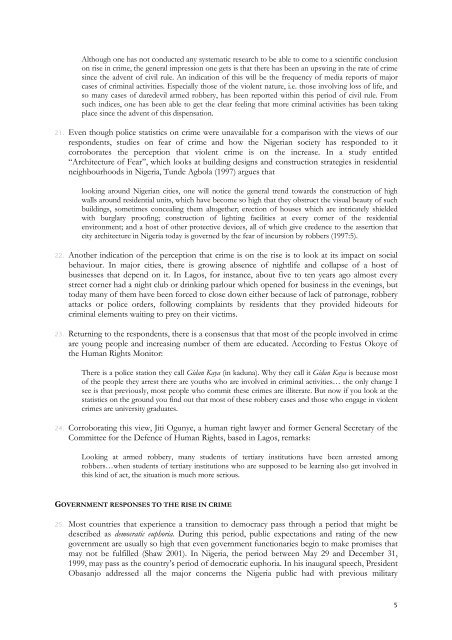114 - Nigeria - Crime and Human Rights Shettima, Kole - The ICHRP
114 - Nigeria - Crime and Human Rights Shettima, Kole - The ICHRP
114 - Nigeria - Crime and Human Rights Shettima, Kole - The ICHRP
Create successful ePaper yourself
Turn your PDF publications into a flip-book with our unique Google optimized e-Paper software.
Although one has not conducted any systematic research to be able to come to a scientific conclusion<br />
on rise in crime, the general impression one gets is that there has been an upswing in the rate of crime<br />
since the advent of civil rule. An indication of this will be the frequency of media reports of major<br />
cases of criminal activities. Especially those of the violent nature, i.e. those involving loss of life, <strong>and</strong><br />
so many cases of daredevil armed robbery, has been reported within this period of civil rule. From<br />
such indices, one has been able to get the clear feeling that more criminal activities has been taking<br />
place since the advent of this dispensation.<br />
21. Even though police statistics on crime were unavailable for a comparison with the views of our<br />
respondents, studies on fear of crime <strong>and</strong> how the <strong>Nigeria</strong>n society has responded to it<br />
corroborates the perception that violent crime is on the increase. In a study entitled<br />
“Architecture of Fear”, which looks at building designs <strong>and</strong> construction strategies in residential<br />
neighbourhoods in <strong>Nigeria</strong>, Tunde Agbola (1997) argues that<br />
looking around <strong>Nigeria</strong>n cities, one will notice the general trend towards the construction of high<br />
walls around residential units, which have become so high that they obstruct the visual beauty of such<br />
buildings, sometimes concealing them altogether; erection of houses which are intricately shielded<br />
with burglary proofing; construction of lighting facilities at every corner of the residential<br />
environment; <strong>and</strong> a host of other protective devices, all of which give credence to the assertion that<br />
city architecture in <strong>Nigeria</strong> today is governed by the fear of incursion by robbers (1997:5).<br />
22. Another indication of the perception that crime is on the rise is to look at its impact on social<br />
behaviour. In major cities, there is growing absence of nightlife <strong>and</strong> collapse of a host of<br />
businesses that depend on it. In Lagos, for instance, about five to ten years ago almost every<br />
street corner had a night club or drinking parlour which opened for business in the evenings, but<br />
today many of them have been forced to close down either because of lack of patronage, robbery<br />
attacks or police orders, following complaints by residents that they provided hideouts for<br />
criminal elements waiting to prey on their victims.<br />
23. Returning to the respondents, there is a consensus that that most of the people involved in crime<br />
are young people <strong>and</strong> increasing number of them are educated. According to Festus Okoye of<br />
the <strong>Human</strong> <strong>Rights</strong> Monitor:<br />
<strong>The</strong>re is a police station they call Gidan Kaya (in kaduna). Why they call it Gidan Kaya is because most<br />
of the people they arrest there are youths who are involved in criminal activities… the only change I<br />
see is that previously, most people who commit these crimes are illiterate. But now if you look at the<br />
statistics on the ground you find out that most of these robbery cases <strong>and</strong> those who engage in violent<br />
crimes are university graduates.<br />
24. Corroborating this view, Jiti Ogunye, a human right lawyer <strong>and</strong> former General Secretary of the<br />
Committee for the Defence of <strong>Human</strong> <strong>Rights</strong>, based in Lagos, remarks:<br />
Looking at armed robbery, many students of tertiary institutions have been arrested among<br />
robbers…when students of tertiary institutions who are supposed to be learning also get involved in<br />
this kind of act, the situation is much more serious.<br />
GOVERNMENT RESPONSES TO THE RISE IN CRIME<br />
25. Most countries that experience a transition to democracy pass through a period that might be<br />
described as democratic euphoria. During this period, public expectations <strong>and</strong> rating of the new<br />
government are usually so high that even government functionaries begin to make promises that<br />
may not be fulfilled (Shaw 2001). In <strong>Nigeria</strong>, the period between May 29 <strong>and</strong> December 31,<br />
1999, may pass as the country’s period of democratic euphoria. In his inaugural speech, President<br />
Obasanjo addressed all the major concerns the <strong>Nigeria</strong> public had with previous military<br />
5
















